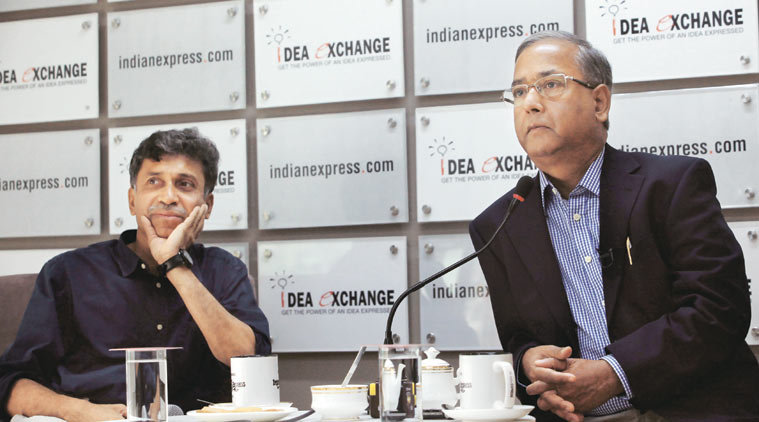- India
- International
Every market misconduct, dubbed scam, has taken capital market back by 10 years: SEBI chairman UK SInha
U K Sinha says some of SEBI’s rules are “more stringent” than that of the Companies Act and argues that phone-tapping powers can be misused.
 Editor (Mumbai) Shaji Vikraman, who moderated this Idea Exchange session, with SEBI chief U K Sinha at The Indian Express office. (Source: Express Photo by Amit Mehra)
Editor (Mumbai) Shaji Vikraman, who moderated this Idea Exchange session, with SEBI chief U K Sinha at The Indian Express office. (Source: Express Photo by Amit Mehra)SEBI chairman U K Sinha defends relaxing of norms for listing start-ups, talks of steps the regulator has taken to boost retail investor confidence, says some of SEBI’s rules are “more stringent” than that of the Companies Act and argues that phone-tapping powers can be misused.
Why U K Sinha?
U K Sinha, chairman of the Securities and Exchange Board of India, has pushed for easier rules for listing India’s start-ups. The new rules, he believes, will prompt many of the growing e-commerce firms to look at issuing shares in India, thus helping local investors become a part of their growth story. He is also steering the merger of SEBI with the Forward Markets Commission, the chief regulator of commodity futures market. Sinha, who will complete five years in office early next year, has helped in easing the IPO process and pushed for greater compliance by PSUs on listing norms, besides introducing new rules on insider trading.
Watch Video: U.K. Sinha On The Norms For Independent & Women Directors
[App users click here to see video]
Shaji Vikraman: SEBI’s easing of norms for start-ups to list on bourses has raised concerns of high valuation of e-commerce companies. Does the current valuation of some start-ups worry you?

The assets of these start-ups are virtual, not tangible. Valuating them is a challenge, so you don’t allow them to list in India and let them go wherever (for raising capital). SEBI has decided not to let go of this opportunity because the world over, they are being listed, getting very high valuations, and investors and promoters are exiting at a profit.
Watch Video | U.K. Sinha: Rajat Gupta Would Not Have Been Caught If The Case Had Happened in India
[App users click here to see video]
So we have relaxed the requirements for listing, because it would be unimaginable for these companies to meet the standard requirements for listing meant for the more traditional companies. But we have also said that only institutional investors or those who put in Rs 10 lakh or more can come in. So we have tried to strike a balance.
Harish Damodaran: Do these companies pose systemic risks? Like in the case of Sahara, despite it not being a listed company, SEBI only intervened because of a systemic risk angle. So can you ignore that billions are being poured into this and if a bust happens, what will happen to the capital flows to India?
The question of systemic risk arises once you worry about any contagion coming in — but there is no scope for that to happen. Because whether SEBI decided to allow them to list or not, private venture capital money and high net-worth individuals’ money was coming in — only they were not getting listed. These investors have market knowledge and deep pockets and will make an informed decision.
Watch Video: U.K. Sinha On Why Listing Norms For Start-Ups Has Been Relaxed
[App users click here to see video]
But it is quite possible that some of these companies won’t be profitable. If you talk to any venture capitalist, he will say that he’s very happy if 25 per cent of his investments make profit, but by making profit in this 25 per cent, he covers the losses made in the remaining 75 per cent. So there may be failures here, but that is why retail (investor) has been kept out.
Anil Sasi: The aspect of price manipulation on the opening day of the stock lists… How much has that been curbed with call auction?
It has been completely curbed, not just partially. Look at the data in the last three years since SEBI introduced it. It was quite common on the day of the listing that a
Rs 100 share would start trading at Rs 30, go up to Rs 130, then Rs 200, then come down again to Rs 50. That sort of hassle was taking place because some people were able to misuse it by trading a small number of shares. That has been completely eliminated by SEBI’s rule that there must be a call auction on the opening day, in the pre-open market.
P Vaidyanathan Iyer: What steps would you suggest to get more retail into the capital market, because we are far from active retail participation? Is there a lack of trust in the capital market?
I am glad you used the word trust. If we say the number of investors isn’t growing, let’s look at the root cause and what are the trust measures that the government and SEBI have taken in the last five years. I am very optimistic that it is only a lag effect and these measures taken by SEBI are going to have a tremendous impact on the market as far as participation is concerned. Why? I’d like to take a stand and say every major incident of market misconduct, known in the media as scam, has taken the capital market at least 10 years backwards.
[related-post]
I request you to get out of that same mindset and start looking at the major steps. I’ll start with investor complaints. We had one lakh investor complaints. Today, at SEBI, we have 5,700 investor complaints in our core system, over 50 per cent of which are addressed within 30 days. Earlier, it would take years together. Many complainants say ‘my broker has traded without my authorisation’. SEBI now insists that every time a transaction is done on behalf of a client, an e-mail or SMS will go to that person. Now over 90 per cent of clients are getting that SMS. From operating in four metros, investor grievance redressal centres are now present in 12 metros.
Maneesh Chhibber: What steps have you taken to protect minority shareholders?
In February and May 2013, SEBI came out with guidelines on protecting the interests of the minority shareholders. We also came out with revised guidelines on corporate governance in 2014.
The law in this country is clear. If there is some measure to be taken, SEBI is authorised by law and even courts have accepted that our measures can be more stringent than the Companies Act. For example, the Act says you can be an independent director in up to 10 companies. But SEBI felt that no independent director can do justice to more than seven companies, because of the number of meetings and committees you have to attend every quarter, so we have reduced that. Then there was the question of what should be the ratio of independent directors to associate directors. We said that if there is a full-time director, who is also chairman of the board, then 50 per cent should be independent directors. And if there’s an independent director as chairman, then it should be 33 per cent.
Then we come to the question of related party transactions. In the Companies Act, only if you are directly related to that particular transaction, you are debarred from voting, but other promoters can vote. In a firm, a certain product was purchased from a private company belonging to the the wife of the promoter, and she held 2 per cent of the share in that company. So only she was debarred. Under SEBI rules, that cannot happen. In our case, we have said that irrespective of whether you are party to that transaction, we are going by the concept of whether you are a related party or not.
P Vaidyanathan Iyer: Companies have made a mockery of the position of independent director. They get in their friends, friends’ friends, wives, etc as independent directors just to fulfil the 50 per cent norm or get one woman director on board. Do independent directors add value?
It is no longer possible for somebody’s wife or brother to be made independent director. The definition of who cannot be an independent director is clear. But it is possible to appoint a friend, because it is difficult to define a friend by law. Anybody can be a friend and inducted. Some purists doubt the concept of independent directors. But nobody is coming forward with alternatives. So within the limitations of law, we have tried to improve on the past. The institutional investor, who is minority by nature, has started playing an important role. In the last two-three years, there have been many examples of minority shareholders agitating against certain management decisions. In one case of a large company, they were able to ensure that the proposal to enhance the compensation of the CEO was shot down. SEBI has played a small role — we have told mutual funds that they must have a voting policy and maintain a record of their voting on their websites.
Santosh Tiwari: Even if you empower the regulator, the laws themselves are not adequate to handle a scam and look after retail investors. Is SEBI empowered enough to tackle a scam like Saradha? Have the laws been changed adequately?
Yes, substantially so. The securities market in India today is being regulated as well as one of the best dominions in the world. Two months ago, the International Organisation for Payment and Settlement rated only six countries, including India, at the highest level — 4 out of 4. The World Bank in October 2014 ranked India 7 on protection of minority shareholders, up from 49 in 2012 and 34 in 2013.
The question of whether laws have been amended or not — at least in the entire capitalist world, the laws are strengthened only when a crisis happens. The Dodd-Frank law would have never been enacted in the US if the 2008 global financial crisis hadn’t taken place.
In India, certain amendments did take place in 2014, but before that, three rounds of ordinances were issued by the government to amend the SEBI Act. It is very uncommon that an ordinance happened when an election was announced.
From 2013 to the first three months of this year, SEBI has been able to pass orders in 224 cases. I challenge any person to tell me whether any regulatory body in India or outside has passed even half that many orders. We have attached more than Rs 2,000 crore of assets since September 2014. So my feeling is that Parliament and the government are very keen that the interests of the investor are protected.
While there have been mishaps in the past, if you are working in SEBI, you can be proud of two things. The SEBI Act was amended giving them the powers that were required. But more importantly, the Forward Market Commission has been merged with SEBI. So somebody in this country or Parliament has reposed some faith in SEBI as an institution.
Subhomoy Bhattacharjee: In the insider trading legislation, wasn’t the public servant finally left out? Public servant is not defined as an insider whereas in the original Sodhi committee report, it was there.
The world is full of people who have a very wide spectrum of views. In that committee, there were some people who thought that why not include the public servants by name. When they had invited me for one of their committee meetings, one member of the committee said that why not involve judges. The reason he gave was that if a judge has heard a matter and the order he is going to pass may have impact on the share price, and that can be misused.
In our wisdom, while these are very good arguments to make, no regulator should fall into that trap. If there is evidence that anybody has misused the unpublished price-sensitive information, it can be covered. So in our view and wisdom, we decided not to fall into this trap.
Shobhana Subramanian: Is it worth bringing back upfront commission for mutual funds?
No. Let me also tell you because some of you might be wondering that earlier you had a different view and now you have a different view because of a change of seat. As Association of Mutual Funds of India chairman, I was against (the ban on the commission) but with SEBI having introduced and implemented it for over six years now, I’d say that bringing it back would be a very, very retrograde step. Let us not do it. However, we have not said that commissions cannot be paid. If you look at the two regulations SEBI drafted in the last two years — the Investors Regulation and the Research Analyst Regulation — the whole idea is to create a system in which either you are distributing something or advising someone. If you are distributing some product, then you can claim from the manufacturer of that product. But if you are advising an investor, then you have to have a fiduciary relationship. Your advice must be based on the best interest of that investor and not on the highest commission somebody can give. That conflict has to be resolved. We have given this as an idea, but have so far implemented it in a mild manner.
The investor-advisor regulation should be tougher, could have been tougher. Even today, we come across examples of when people are doing both. We are waiting for some more time, for markets to develop, for more energy to come. Then we will have a look at it.
P Vaidyanathan Iyer: SEBI had earlier tightened IPO rules for FIIs and brought them on a par with retail by asking them to pay 100 per cent subscription amount in advance. But now anchor investors are allowed to benefit from preferential allotment of shares ahead of the IPO. How do you explain this?
Not at all. An anchor investor has an obligation on day one that he cannot sell for the next 30 days. He is given assured allotment but he is obliged to remain invested for 30 days whatever happens to the price. Yes, discretionary allotment and only certain class of investors can claim to be anchor investors. So right now, our IPO role is that if the issue is over-subscribed, then there will be proportional allotment. In case of anchor investor, it is a discretionary allotment however. So they have a very important obligation to remain invested for 30 days.
Subhomoy Bhattacharjee: Several government officers have joined private sector companies, listed or unlisted, after retirement. As a regulator, how do you look at this phenomenon?
If there is a conflict of interest, then it should be looked into very, very seriously. If someone has worked in or outside the government, as a banker or in some other capacity and has acquired knowledge to work in serving boards, then how can we deny him that opportunity? However, if there is the slightest favouritism due to a past favour or conflict of interest, that should be highlighted.
Sandeep Singh: If the Rajat Gupta case had happened in India, do you think he would have been caught?
He got caught because the US Department of Justice got involved. And the department did the phone tapping, and all the evidence came through that. We do not have that power. Period. The only power that has been given to us in the amended law is that we can ask for the call data records.
Sandeep Singh: Why did you not ask for such powers?
As an individual, as a citizen of this country, I have not been asking for it. I believe that the privacy of the citizens should be honoured, and that violation of security laws is not something that should be compromised on. This is my personal view. As a citizen of this country, because I have worked in other ministries dealing with national security and all, these can be misused. Don’t forget that. During my tenure, I never asked for it. All I asked for was call data records and those I got. I am very clear in my mind.
Transcribed by Shantanu David & Somya Lakhani
May 18: Latest News
- 01
- 02
- 03
- 04
- 05




























